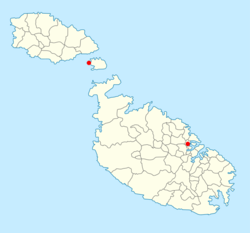People's Republic of Blejord
This article refers to a micronation or element of micronationalism which is defunct and no longer exists. You can help make the article reflect that or ask on the talk page for further information. |
People's Republic of Blejord Volksrepubliek Bleerd Rebilikafolk ta' Blajr | |
|---|---|
| Motto: “To each, his own” - “Ieder zijn mening” | |
| Anthem: Venceremos | |
 Malta | |
| Capital | New Quolia |
| Largest city | Kemunett |
| Official languages | English, Dutch, Blajr't; Maltese recognized |
| Demonym(s) | Blajr |
| Government | Republic following Marxist ideals |
| Establishment | Kingdom: 12 June 2011 Republic: 3 July 2011 |
| Population | |
• Census | 1 |
| Currency | De jure: None De facto:The Euro |
| Time zone | UTC+1 |
The People's Republic of Blejord (bɫɛ'jɔːɽð Dutch: Volksrepubliek Bleerd Blajr't: Rebilikafolk ta' Blajr) was a micronation founded on 3 July 2011. It was the successor nation to the Kingdom of Blejord, which was in turn the successor of Quolia and BlueSkies. Blejord claimed an uninhabited island called "Cominotto" and a flat in Malta. The government attempted to create a vibrant culture for Blejord with a full cuisine, language and arts.
Etymology
The name "Blejord" came from the Danish word for land, "jord" and the demonym for citizens of BlueSkies, "Blezki".
History
Established 12 June 2011 as the Kingdom of Blejord, Blejord was the successor to the Kingdom of Quolia and to the Federal Republic of BlueSkies. This Kingdom did not last very long, however, and was reformed to a People's Republic based on Marxism on 3 July later that year after the King had a realisation that he was "more privileged than other people, and couldn't stand there doing nothing". The micronation had collapsed by late 2012, and had been succeeded by Blesbi, which was in turn succeeded by Volfa in January 2013.
Culture

The language, Blajr't, was planned to be an Anglicised mix of Maltese grammar and Dutch vocabulary, using a modified Latin alphabet. Sculpting and abstract art was highly prized, with the national art form being Neo-Naakafi art. Blejord itself was established on a drawing in Neo-Naakafi, called "Noane". The olive branch was a symbol of Blejord, symbolising victory and Blejord's predecessor, the Kingdom of Quolia. Most citizens of Blejord typically liked to read about other cultures around the world, which usually influenced the Blajr culture.
Economy
In Blejord, the people viewed currency as a "tool to control people" and desired to abolish it in favour of a trading system. However, this was almost impossible for the nation to achieve and thus the Euro was used when there was no other choice.
See also
 | Available micronational languages:
• Francilisch |

